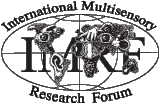Effects of auditory stimuli on visual velocity perception
Last modified: 2011-09-02
Abstract
We investigated the effects of auditory stimuli on the perceived velocity of a moving visual stimulus. Previous studies have reported that the duration of visual events is perceived as being longer for events filled with auditory stimuli than for events not filled with auditory stimuli, i.e., the so-called “filled-duration illusion.” In this study, we have shown that auditory stimuli also affect the perceived velocity of a moving visual stimulus.
In Experiment 1, a moving comparison stimulus (4.2~5.8 deg/s) was presented together with filled (or unfilled) white-noise bursts or with no sound. The standard stimulus was a moving visual stimulus (5 deg/s) presented before or after the comparison stimulus. The participants had to judge which stimulus was moving faster. The results showed that the perceived velocity in the auditory-filled condition was lower than that in the auditory-unfilled and no-sound conditions. In Experiment 2, we investigated the effects of auditory stimuli on velocity adaptation. The results showed that the effects of velocity adaptation in the auditory-filled condition were weaker than those in the no-sound condition. These results indicate that auditory stimuli tend to decrease the perceived velocity of a moving visual stimulus.
In Experiment 1, a moving comparison stimulus (4.2~5.8 deg/s) was presented together with filled (or unfilled) white-noise bursts or with no sound. The standard stimulus was a moving visual stimulus (5 deg/s) presented before or after the comparison stimulus. The participants had to judge which stimulus was moving faster. The results showed that the perceived velocity in the auditory-filled condition was lower than that in the auditory-unfilled and no-sound conditions. In Experiment 2, we investigated the effects of auditory stimuli on velocity adaptation. The results showed that the effects of velocity adaptation in the auditory-filled condition were weaker than those in the no-sound condition. These results indicate that auditory stimuli tend to decrease the perceived velocity of a moving visual stimulus.


